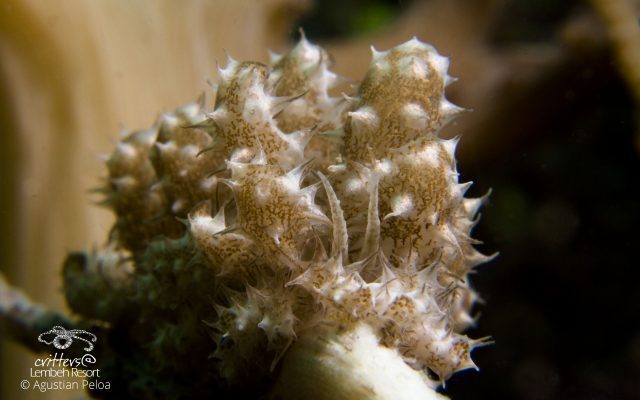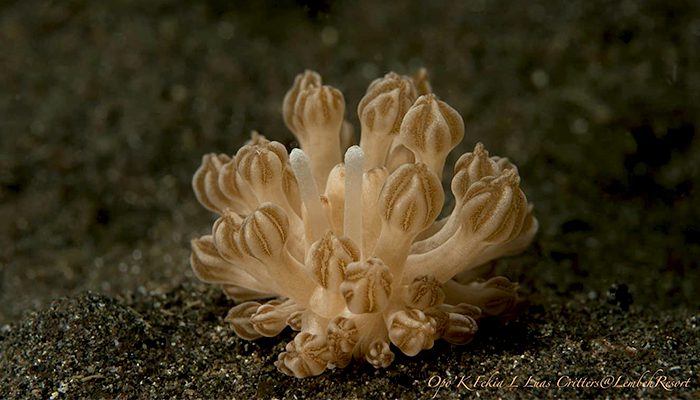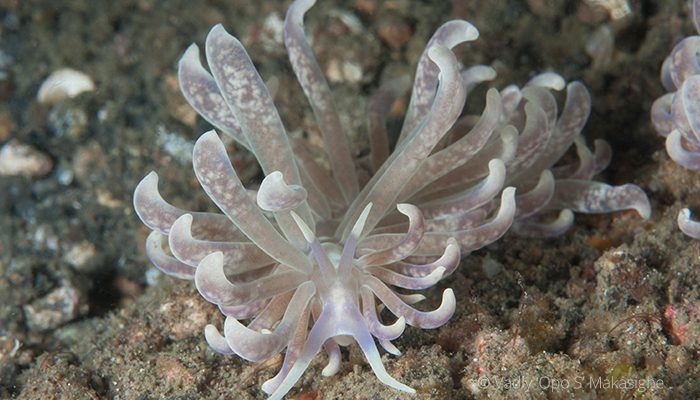Solar Powered Nudibranch – How Does That Work?
This month we are taking a closer look at nudibranch of the Lembeh Strait and one species in particular has caught our attention. Have you heard of the solar powered nudibranch? They are rare finds, extremely photogenic and we see them here in Lembeh.

Phyllodesmium koehleri
Photo by Agustian Peloa
How does a solar powered nudibranch actually work
For those of you who have been wandering exactly how solar powered a solar powered nudibranch really is, here are some interesting facts about this cryptic critter as well as the science behind the name:
- Solar powered nudibranch are actually a family of nudibranch known as Phyllodesmium. They are an aeolid nudibranch which means their bodies are covered in “cerata”, which are finger like projections – similar to Flabellina nudibranch, which are also seen here in Lembeh.
- Some aeolid nudibranch feed on cnidarians, such as sea anemones, and they can absorb the anemones stinging cells and store them in the tips of their cerata for their own defence. Solar nudibranch however, use their cerata for a much more complex purpose.
- Solar powered nudibranch feed on soft corals and they are able to remove the algae intact from the coral’s tissues and store it in their cerata. The intact algae continues to photosynthesize within the cerata and begins to supply the nudibranch with an ongoing supply of manufactured sugars. Soft corals are clearly the food of choice that keep on giving for this species!
- One of the most productive users of solar power in this family of nudibranch is the Phyllodesmium longicirrum which captures and farms the algae from the soft coral in its large flattened cerata. Due to the large surface area of this nudibranch’s cerata they act as solar panels! This is a species which we often see here in the Lembeh Strait – usually around the leather corals which it feeds and extracts the algae from.
- What about the Algae? Don’t feel too sorry for it! Algae cannot survive on their own and need a host to work in symbiosis with. For the algae this is simply a relocation. Studies have shown that the zooxanthellae (algae) within the nudibranch’s body breed rapidly, and at the same time produce nutrients far in excess of their own requirements, suggesting that they are living in a healthy protected environment, akin to growing plants in a greenhouse.
- Just how effective are solar powered nudibranch? How much of a solar nudibranch’s energy comes from photosynthesis varies from species to species but it is thought that the highly productive Phyllodesmium longicirrum depend on their chloroplast captives for as much as a quarter of their energy needs.
- In Lembeh we have 9 different species of Phyllodesmium nudibranch, including: Phyllodesmium briareum, 2. Phyllodesmium briareus, 3. Phyllodesmium crypticum, 4. Phyllodesmium jakobsenae, 5. Phyllodesmium karbiranum, 6. Phyllodesmium koehleri, 7. Phyllodesmium longicirrum, 8. Phyllodesmium magnum and 9. Phyllodesmium rudmani. Do you want to know more about these species? Find them all in our Critter Log!

Phyllodesmium rudmani
Photo by Opo Kecil
Are you a nudibranch aficionado? In Lembeh we see some of the world’s rarest and most unique nudibranch species – including some endemic species too. The famous muck diving sites of the Lembeh Strait are also a great place for observing nudibranch behavior including mating, hatching and feeding. When you are not busy watching nudibranch there is a plethora of other weird and unusual critters to keep you busy!

Phyllodesmium parangatum
Photo by Opo S Makasighe
Plan Your Next Underwater Photography Trip with Lembeh Resort
Are you planning your next extraordinary underwater photography trip? At Lembeh Resort we have a full time, on site Photo Pro, extensive camera facilities and an in-house marine biologist to help you with critter identification too. Check out our next Capturing Critters in Lembeh Underwater Photography workshop here. To make an inquiry or reservation contact us on: reservations@LembehResort.com
Discover Lembeh Resort Rates and Reserve Your Stay:
Visit our website to explore Lembeh Resort rates and find the perfect package for your next underwater photography adventure. Capture the mesmerizing critters of Lembeh with the guidance of our experts, while enjoying luxurious accommodations and exceptional service. We eagerly await the opportunity to welcome you to our beautiful Indonesian resort and provide you with an unforgettable experience at Lembeh Resort.



